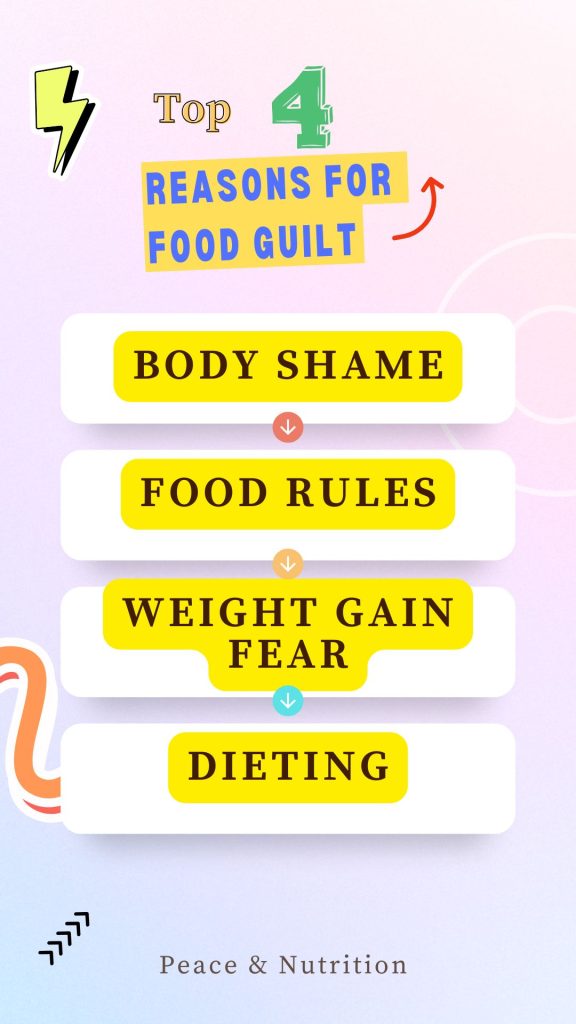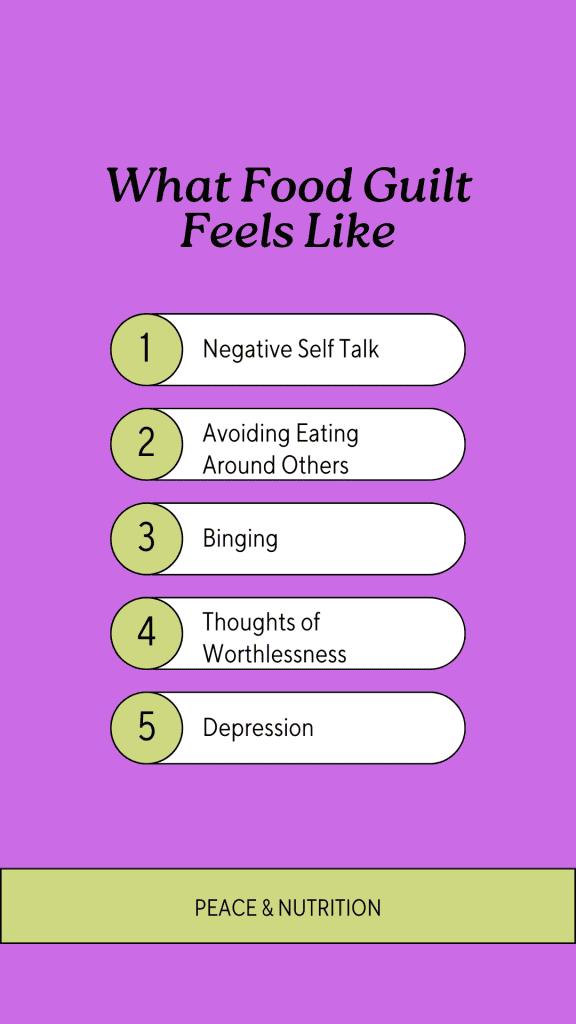Table of Contents
Sharing is caring!
Do you feel guilty after eating? Do you notice a spike in food guilt after you have eaten certain foods or a bigger portion than you intended? When I was deep in my eating disorder, I often used to wonder “why do I feel guilty after eating?” I felt like my life was a constant replay of how much, when and what I should be eating.
But the food and my perceived “lack of willpower” was never the problem.
Feeling guilty after you eat can spike from:
Diet culture has a very specific set of rules about why you should feel guilty about well… basically everything you eat. While you might feel like you have personally failed if you haven’t met societies rules about food, its really the system thats failing you and causing your food guilt.
This article digs into what food guilt is, when you probably have food guilt, and how to get rid of food guilt for good.

What Is Food Guilt
Food guilt is when you experience strong negative emotions after eating certain foods.
Examples of food guilt include:
- I can’t believe you ate that! You’re completely out of control
- You just ate an entire bag of chips, no wonder you’re so fat
- You’re so gross. Don’t let anyone see you eating that.
- I ate so many carbs. I’m going to get fat.
- You’re so gross. You’re eating more than everyone else in the room. No wonder you can’t lose weight.
- There’s nothing but processed crap in that. You shouldn’t have eaten it.
- I didn’t need that food.
While not all food guilt is the result of an eating disorer, it can be a risk factor for developing one. Sometimes food guilt can be so extreme that it escalates into eating disorders such as bulimia nervosa, anorexia nervosa, atypical anorexia, or orthorexia. If you have an eating disorder, your eating disorder voice can lead to constantly feeling guilty about food.

Why Do I Feel Guilty After Eating
Most food guilt comes from harmful messages about what bodies should like like and what foods should be off limits. In western culture, thin privilege is strong and oppressive. If you don’t live in a thin body, you are told that you you should hate your body and restrict your food until your body is thin. The real truth here however is that no body is thin enough for diet culture. Falling for this lie will cause you to feel guilty about food forever.
You are also bombarded with messages about “good foods and bad foods” which might make it impossible for you to feel like you can trust your body to tell you what it needs.
Food guilt comes from:
- Messages in the media
- Influence of friends and family
- Educational systems obsessed with counting calories
- Our thin-obsessed society
- Our healthcare system
Food guilt does not come from Food. It comes from culture.
Is Food Guilt Different Than Guilt Eating
Yes.
Food guilt comes from feeling food shame about what you have already eaten or are about to eat while guilt eating is when you eat to soothe a difficult emotion.
Eating to soothe a difficult emotion (or guilt eating) is not always a bad thing. Guilt eating can in fact be a healthy way to cope with difficult emotions, as long as it isn’t done every time a difficult emotion comes up. Many intuitive eaters will experience guilt eating from time to time and it can be a very powerful and effective coping tool.
Food guilt on the other hand, is never a good thing.
Common Food Guilt Triggers
Feeling Guilty After Eating Sweets
Foods that contain sugar such as cookies, candies, cakes or syrups are often sold to us as being “junk food” or the poor food choice. You have probably heard that you should limit sugar at all costs from not only the media but also school systems or your doctor. While none of this is true (and glucose aka sugar) is actually the one source of food your body needs the MOST, we remember the messages forever.
You learn that “sugar is bad” or at least the lower quality food choice as early as childhood when you are told to wait to eat your dessert until after dinner.
Common messages that make you feel guilty about eating sugar include:
- Sugar is toxic
- Sugar is addicting
- Added sugar makes you fat
- You don’t “need” added sugars
- Sugar is a “treat” and you should only eat it in moderation
Since sugar is the most common food to be off limits in your earliest memories, its no wonder you feel guilty after eating sweets. However, restricting sweets is exactly what will make you feel like you’re craving carbs and binging on sugar when it does become available.
Holiday Food Guilt
Holidays can trigger a lot of food guilt because foods might be available that you usually restrict.
Holiday food guilt might come up if:
- You start to feel out of control with food because you’ve been restricting it
- Your family comments when you go for seconds
- Your family pushes you to eat certain foods they’ve made that you don’t want
- Your family comments on your food choices
Feeling Guilty After Weight Gain
If your body has changed recently, you may notice an uptick in the negative thoughts you have about food.
You. might feel guilty about food after weight gain because:
- You feel like food has caused your weight gain
- You feel like weight gain is bad
- You feel like if you eat less or change what you eat you would lose weight
- You feel like people won’t love you now that you’ve gained weight
In reality, body changes are completely normal and are not always related to what you eat.
Feeling Guilty After A Binge
Binge eating can be one of the most common reasons you feel guilty about eating. Feeling guilty after a binge is actually what distinguishes binge eating from just eating a lot of food.
You might feel guilty after a binge because:
- You feel out of control with food
- You feel like if you start eating trigger foods you’ll never stop
- You feel anxious about gaining weight
- You feel like you are required to restrict food at the next meal to not feel bad
Unfortunately, the food guilt you feel after binging can lead to food restriction which can cause more intense and more frequent binging.
Is It Bad If I feel Guilty After Eating
Yes.
No matter what you have eaten or how much feeling guilty about it will not help! In fact, it will probably just lead to anxiety, body shame, and feeling completely out of control with food. None of the side effects of food guilt will improve your health in any way!
You cannot shame your way into a different body or healthier eating habits.
Food guilt is likely to lead to:
- Food restriction
- Negative self-esteem
- Extreme hunger
- Feeling powerless
- Thoughts of worthlessness
- Depression
- A binge restrict cycle
- Food apathy
- Compulsive exercise
Is Feeling Guilty After Eating An Eating Disorder
Feeling guilty after eating can be a warming sign of an eating disorder. However, food guilt by itself does not mean that you have an eating disorder.
Some signs that food guilt might be an eating disorder include:
- The food noise is loud and constant. You’re thinking about food or your body most of the day
- You miss social activities because you don’t want to feel guilty about eating
- You feel like you must compensate for what you’ve eaten if food guilt comes up with exercise
- You begin abusing laxatives or making yourself vomit in responseto food guilt
- You have body dysmorphia
If you have any of these symptoms, it’s important you tell someone you trust about your eating disorder right away. Remember you are not alone on your journey to making peace with food. Check out this list of eating disorder recovery books and additional resources to learn about others’ journeys to making peace with food. You can also check out my anorexia story to see my journey in making peace with food.

10 Steps to Stop Feeling Guilty After You Eat
In order to release food guilt, let go of ideas of what you “should” and “should not eat.”Refrain from creating food rules that will compromise your relationship with food.
Because how you feel about the way your body looks can directly influence your relationship with food, you must also learn to respect our body and develop body trust before food guilt is likely to go away.
10 Steps stop feeling guilty after you eat:
- Eat at regular meal intervals (no more than 4 hours apart between meals/snacks). This will help you trust your hunger.
- Identify and get rid of food rules
- Practice intuitive eating
- Honor all type of hunger
- Work through any fear of gaining weight
- Eat a variety of food (especially fear foods) and practice sitting with negtive feelings without judgement
- Practice food neutrality
- Stop body checking (it leads to negative body image and food guilty)
- Switch up the routine. Try eating at different times of the day or eating dessert first
- Work with a HAES dietitian
- I Wish I Had More Control With Food - November 18, 2025
- The Fattest Person in the Room - November 18, 2025
- 10 Tips To Cope With Bad Body Image Days - September 29, 2025